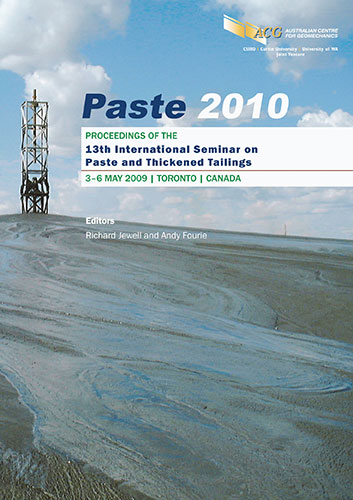Design of the paste backfill recipe for the Pinos Altos Mine, Mexico — influence of tailings clay mineral fraction on strength and rheology

|
Authors: Ouellet, S; Brunet, F |
DOI https://doi.org/10.36487/ACG_rep/1063_19_Ouellet
Cite As:
Ouellet, S & Brunet, F 2010, 'Design of the paste backfill recipe for the Pinos Altos Mine, Mexico — influence of tailings clay mineral fraction on strength and rheology', in R Jewell & AB Fourie (eds), Paste 2010: Proceedings of the Thirteenth International Seminar on Paste and Thickened Tailings, Australian Centre for Geomechanics, Perth, pp. 217-227, https://doi.org/10.36487/ACG_rep/1063_19_Ouellet
Abstract:
Agnico-Eagle Mexico S.A. de C.V. (AEM) plans to commission a new paste backfill plant at the Pinos Altos mine (Mexico) in March 2010. In 2008–2009, the paste recipe was designed to develop required strength for free standing of the backfill in stope after 28 days. This recipe development was not as easy as usual because the tailings contain a significant proportion of clayey minerals and these cohesive minerals control the rheology of tailings. This paper presents the different laboratory investigations performed to achieve the required strength considering the flow characteristics of the tailings. The paste recipe design was performed in two phases. The first one included testing of different paste recipes with varying water and binder (Chihuahua cement) content. The main investigation of the rheology (laboratory rheometer tests) of the paste was performed during this phase. The second phase was carried out to optimise the paste recipe by changing different ingredients to improve the geomechanical properties considering the clay mineral content in tailings. Tests with slag (Lafarge Canada), with deslimed tailings and with water reducing admixtures (BASF Glenium 7700™ and 7102™) were performed (Glenium 7102 and 7700 are trademarks from BASF Construction Chemicals). In this phase, five backfill samples were also cured under 300 kPa of vertical pressure, which is similar to the one estimated at the bottom of a typical stope. Among mixtures tested, paste with 7% Chihuahua cement/71% solids and paste with 7% Chihuahua cement and Lafarge Slag in a 20:80 proportion/71% solids gave the best results. These mixtures were selected for tests under vertical pressure and results showed significant strength increases at 28 curing days relative to the standards. Thus, significant strength increase is expected in stope due to consolidation relative to laboratory results. Tests with deslimed tailings and admixtures were not conclusive, and these options to increase strength were not retained. The rheological measurements performed on all mixtures tested showed a Bingham plastic behaviour. A clear influence of the water and binder content were observed on the yield stress of the paste.
References:
Escalante, J.I., Gomez, L.Y., Johal, K.K., Mendoza, G., Mancha, H. and Mendez, J. (2001) Reactivity of blast-furnace
slag in Portland cement blends hydrated under different conditions, Cement and Concrete Research, Vol. 31,
No. 10, pp. 1403–1409.
Klein, K. and Simon, D. (2006) Effect of specimen composition on the strength development in cemented paste
backfill, Canadian Geotechnical Journal, Vol. 43, pp. 310–324.
Lumley, J.S., Gollop, R.S., Moir, G.K. and Taylor, B.F.W. (1996) Degrees of reaction of the slag in some blends with
portland cements, Cement and Concrete Research, Vol. 26. No. 1, pp. 139–151.
Luo, R., Cai, Y., Wang, C. and Huang, X. (2003) Study of chloride binding and diffusion in GGBS concrete, Cement
and Concrete Research, Vol. 33, No. 1, pp. 1–7.
Malhotra, V.M. (2001) High performance, high volume fly ash concrete for sustainability, in P.-C. Aïtcin Symposium
on the Evolution of Concrete Technology, A. Tagnit-Hamou, K.H. Khayat, R. Gagné (eds), American Concrete
Institute, Quebec and Eastern Ontario Chapter, pp. 19–74.
McCarthy, D.F. (2007) Essentials of soil mechanics and foundations, 7th edition, 850 p.
Mitchell, R.J., Olsen, R.S. and Smith, J.D. (1982) Model studies on cemented tailings used in mine backfill, Canadian
Geotechnical Journal, Vol. 19, pp. 14–28.
Neville, A.M. (1981) Properties of concrete, 3rd edition, Pitman Publisher, London.
Niu, Q., Feng, N., Yang, J. and Zheng, X. (2002) Effect of superfine slag powder on cement properties, Cement and
Concrete Research, Vol. 32, No. 4, pp. 615–621.
Ouellet, S. (2006) Mineralogical characterization, microstructural evolution and environmental behaviour of mine
sulphidic cemented paste backfills, PhD Thesis, Université du Quebec en Abitibi-Témiscamingue, Canada,
Yilmaz, E., Belem, T., Benzaazoua, M. and Bussière, B. (2008) Experimental characterization of the influence of curing
under stress on the hydromechanical and geotechnical properties of cemented paste backfill, In Proceedings 15th
International Conference on Tailings and Mine Waste, Fort Collins, Vail, Colorado, USA, pp. 18–23.
Design of the paste backfill recipe for the Pinos Altos Mine, Mexico — influence of tailings clay mineral S. Ouellet and F. Brunet
fraction on strength and rheology
228 Paste 2010, Toronto, Canada
© Copyright 2026, Australian Centre for Geomechanics (ACG), The University of Western Australia. All rights reserved.
View copyright/legal information
Please direct any queries or error reports to repository-acg@uwa.edu.au
View copyright/legal information
Please direct any queries or error reports to repository-acg@uwa.edu.au